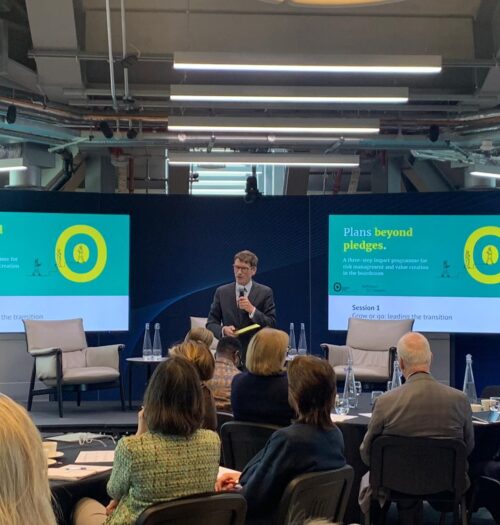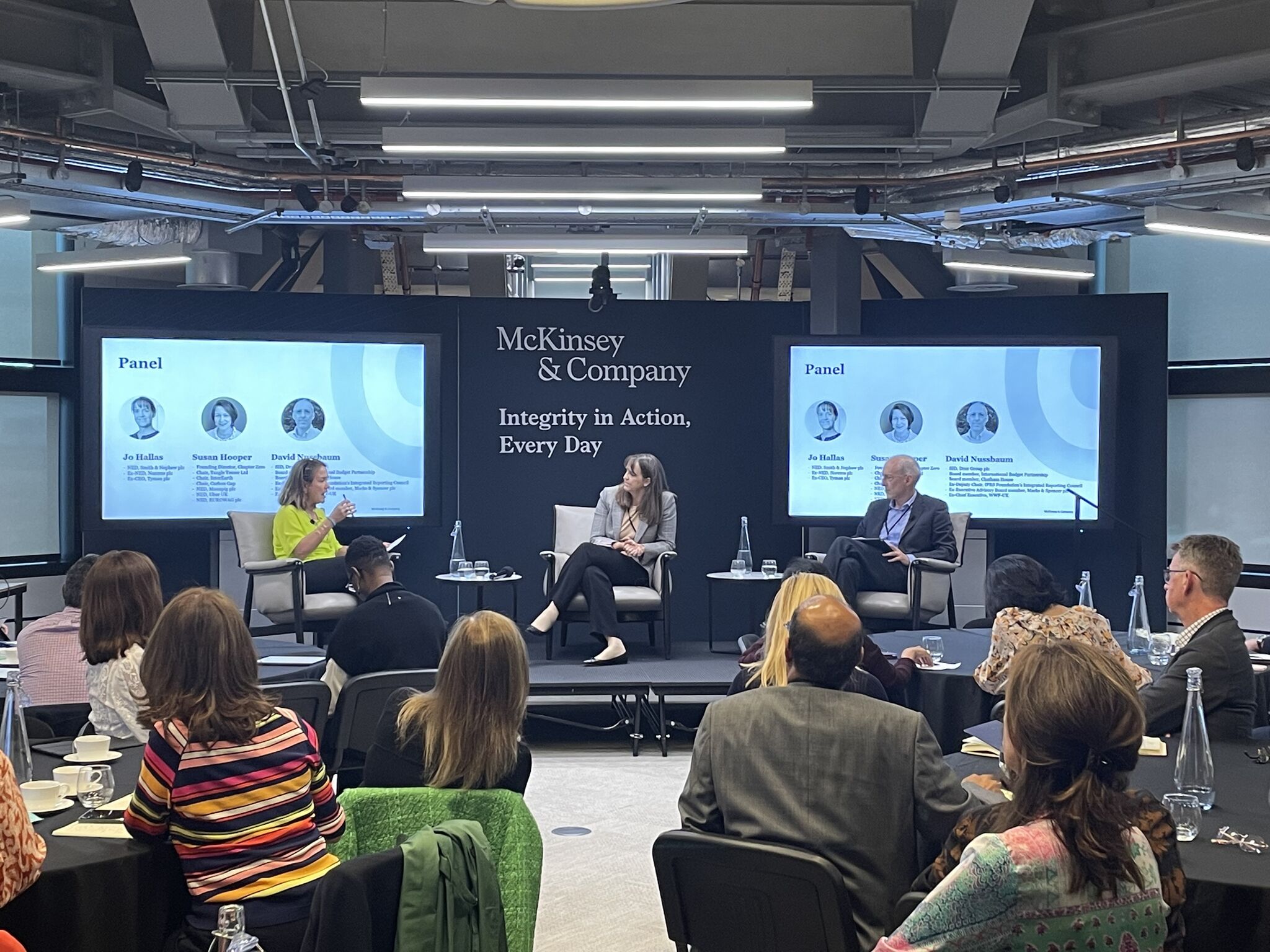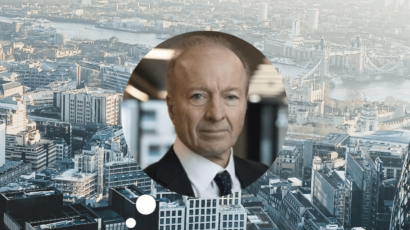
Grow or go: leading the transition
Vicky Moffatt, Chief Executive Officer of Chapter Zero, opened the session by highlighting that the growing interest in climate-related topics has triggered a mindset shift in both the business and NED community. Proof of that is the network’s global expansion to 71 countries, which is clustered into 30 Chapters.
The green growth opportunity
Harry Bowcott, Senior Partner at McKinsey & Company, then discussed the opportunity for UK businesses to transition through green growth.
It is possible for businesses to both grow and decarbonise their operations and supply chain, with the intersection between the two known as ‘green growth’. In a world that is investing an estimated US$9.2 trillion per year through 2050 to mobilise the net-zero transition, agile business investment now is critical to support future investment capacity – with both enabling decarbonisation.
This green growth could be driven through:
- Scaling climate technology, including mature technologies such as wind and solar power, and early adoption technologies such as green hydrogen.
- Investing in climate businesses, which create significant value for shareholders and mitigate carbon emissions.
The UK's growth and productivity have stagnated over the past decade. However, the country has many enduring strengths (e.g., a globally renowned common law system, academic excellence, and leading investment in emerging technologies) to position itself as a significant green growth player. Utilising these strengths could include:
- Developing domestic green infrastructure and supply chains through inward investment;
- Shifting to smarter bets on export markets where the UK has an advantage; and,
- Ensuring wide uptake of green opportunities that save money.
NEDs play an important role in actively supporting UK businesses to move from pledges to deliberate transition plans to net zero. To bring this topic into the boardroom, NEDs could use the following series of questions to start a dialogue with the executive team that challenges the way the business generates value from the net-zero transition:
- Do we have a clear, ambitious target for the size of the growth opportunity through innovation?
- Do we understand how the energy transition will reshape value pools in our markets (and adjacencies)?
- Is our governance creating conditions to take appropriate risks?
- Is our view of the future founded in realistic scenarios?
- Do we have a risk-adjusted portfolio of initiatives for growth?
Discussion and reflections
The final part of the session involved a fireside chat with NED Dr Carol Bell, and NED Sir John Manzoni, moderated by Susan Hooper.
It was emphasised that net-zero goals and ambitions are not a simple on-off switch, but rather a complex transition. Nonetheless, integrating the transition into the company's DNA was stressed as a vital component. Examples provided by the panel reinforced that the workforce should be encouraged to voice their ideas to create climate solutions. A bottom-up approach can help to effectively embed sustainability practices and climate innovations throughout the organisation.
A point for NEDs to understand the level of screening out by investors due to non-compliance with ESG (Environmental, Social and Governance) principles was deemed essential. While acknowledging the significance of benchmarks for investors, a panellist emphasised that boards should not wait for climate benchmarks specific to their business sector – they can take the initiative and create their own bespoke index.
Policy engagement is key and Chapter Zero members discussed the importance of NEDs being influential and engaging in a continuous dialogue with the government. Opportunities to participate in consultations or working groups were highlighted as avenues to influence policy decisions. Moreover, climate action should increasingly be mobilised through industry associations and by collaborating with other businesses.
Finally, the room recognised the challenges to effectively communicating with the government and academic sector – as each seems to have its own ‘language’ – and raised the need to improve the board’s communication skills to bridge these gaps effectively.
Final reflections on moving from pledges to plans included:
- Publication of medium-term transition plans (for accountability).
- Analysis of investment criteria.
- Climate alignment of industry associations.
Key takeaways
- There is significant green growth opportunity for UK businesses, with the possibility of simultaneous growth and decarbonisation. Scaling climate technology and investing in climate businesses could support in creating value and mitigating carbon emissions.
- Net-zero is a complex transition that requires integration into a company's DNA. For instance, by encouraging workforce participation to embed sustainability practices and climate innovations throughout the organisation.
- NEDs play a crucial role in encouraging policy engagement, including engaging in continuous dialogue with the government and participating in consultations or working groups to influence policy decisions. Effective communication skills are necessary to bridge the gaps between business, government, and academic sectors.
This event summary was developed in collaboration with the Centre for Climate Engagement at Hughes Hall.

Next steps
Having explored the strategic fundamentals of green growth, and how NEDs can support organisations to move from pledges to plans and help them achieve low-carbon growth in the first session, the next session delved into how non-executive directors can navigate the net zero transition to shape and implement credible climate strategies. You can read the summary at the link below.
Read the session 2 summary


